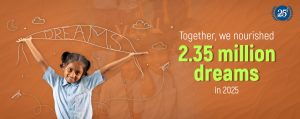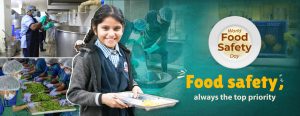
Fortis Investments, an autonomous investment management company has recently joined The Akshayapatra Foundation bandwagon. The management has adopted 229 children in Bangalore from 3 schools where Akshaya Patra’s midday meal programme is practiced.
Mr. Nikhil Johri, the Managing Director of Fortis Investments have gone ahead and set an example to his employees by adopting 178 children from the Government Upper Primary School in Jaipur, who are also fed by Akshaya Patra.
The 229 children adopted by the management study in 3 schools in Bangalore – Government Higher Primary School, Government Urdu Primary School and Government Tamil Primary School in Vasanth nagar.








 Soon after the message reached the employees, a highly enthusiastic team of five people led by Mr. Prabhakar registered themselves as champions and took up the responsibility of creating a buzz about Akshaya Patra among their fellow colleagues. In next few days 22 more employees joined the program and came in to volunteer for Akshaya Patra. Within a very short span of two weeks the number shot up to 180 volunteers. Each volunteer multiplied to the power of ten every day, making the program stronger with each passing sunlight hours. The volunteers drove the program within the company and started collecting donation from employees who wanted to contribute towards the cause. The initiative taken by the staff of BOSCH Automotive inspired BOSCH Software employees to participate in the program and volunteer for The Akshaya Patra Foundation.
Soon after the message reached the employees, a highly enthusiastic team of five people led by Mr. Prabhakar registered themselves as champions and took up the responsibility of creating a buzz about Akshaya Patra among their fellow colleagues. In next few days 22 more employees joined the program and came in to volunteer for Akshaya Patra. Within a very short span of two weeks the number shot up to 180 volunteers. Each volunteer multiplied to the power of ten every day, making the program stronger with each passing sunlight hours. The volunteers drove the program within the company and started collecting donation from employees who wanted to contribute towards the cause. The initiative taken by the staff of BOSCH Automotive inspired BOSCH Software employees to participate in the program and volunteer for The Akshaya Patra Foundation.